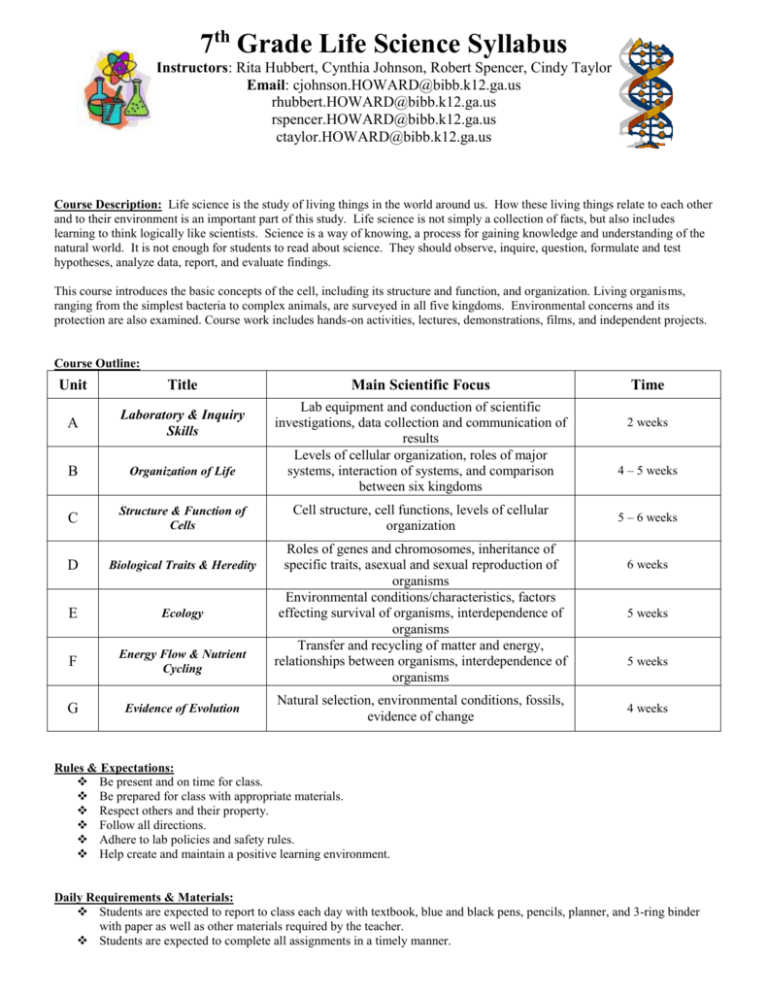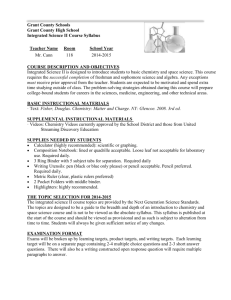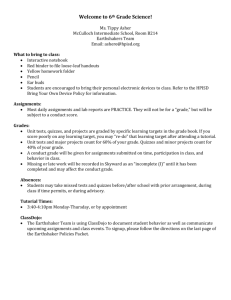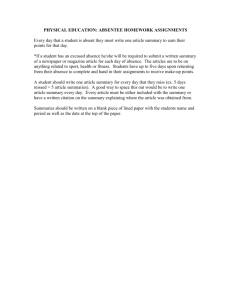7th Grade Life Science
advertisement

7th Grade Life Science Syllabus Instructors: Rita Hubbert, Cynthia Johnson, Robert Spencer, Cindy Taylor Email: cjohnson.HOWARD@bibb.k12.ga.us rhubbert.HOWARD@bibb.k12.ga.us rspencer.HOWARD@bibb.k12.ga.us ctaylor.HOWARD@bibb.k12.ga.us Course Description: Life science is the study of living things in the world around us. How these living things relate to each other and to their environment is an important part of this study. Life science is not simply a collection of facts, but also includes learning to think logically like scientists. Science is a way of knowing, a process for gaining knowledge and understanding of the natural world. It is not enough for students to read about science. They should observe, inquire, question, formulate and test hypotheses, analyze data, report, and evaluate findings. This course introduces the basic concepts of the cell, including its structure and function, and organization. Living organisms, ranging from the simplest bacteria to complex animals, are surveyed in all five kingdoms. Environmental concerns and its protection are also examined. Course work includes hands-on activities, lectures, demonstrations, films, and independent projects. Course Outline: Unit Title A Laboratory & Inquiry Skills B Organization of Life C Structure & Function of Cells D Biological Traits & Heredity E Ecology F Energy Flow & Nutrient Cycling G Evidence of Evolution Main Scientific Focus Lab equipment and conduction of scientific investigations, data collection and communication of results Levels of cellular organization, roles of major systems, interaction of systems, and comparison between six kingdoms Cell structure, cell functions, levels of cellular organization Roles of genes and chromosomes, inheritance of specific traits, asexual and sexual reproduction of organisms Environmental conditions/characteristics, factors effecting survival of organisms, interdependence of organisms Transfer and recycling of matter and energy, relationships between organisms, interdependence of organisms Natural selection, environmental conditions, fossils, evidence of change Time 2 weeks 4 – 5 weeks 5 – 6 weeks 6 weeks 5 weeks 5 weeks 4 weeks Rules & Expectations: Be present and on time for class. Be prepared for class with appropriate materials. Respect others and their property. Follow all directions. Adhere to lab policies and safety rules. Help create and maintain a positive learning environment. Daily Requirements & Materials: Students are expected to report to class each day with textbook, blue and black pens, pencils, planner, and 3-ring binder with paper as well as other materials required by the teacher. Students are expected to complete all assignments in a timely manner. Textbook: In addition to the Prentice Hall textbook, students will be using the SEPUP curriculum which is a hands-on based program. Homework: Students may be assigned homework several times per week. It may be a reading assignment, worksheet, review questions, writing activities, labs, or unfinished classwork. Parents are encouraged to review homework on a regular basis so you can monitor the student’s progress. Students are required to write assignments in their planners every night that it is assigned and will write NONE if no homework is given. All homework is expected to be turned in on time. Quizzes: Quizzes will be administered prior to tests at the teacher’s discretion. Quizzes are learning tools and should be used to prepare for tests. Students should review their daily notes and homework assignments to help study for a quiz. Labs/Lab Summaries (Journals): Ideas become clear when we talk about them and write about them. Students will complete lab summaries in their lab journals at the conclusion of lab activities in class. The purpose of these summaries is problem solving, communicating what you do and do not understand, and reflecting on each investigation. To ensure that students experience interesting and successful labs, it is important that they have a strong understanding of safe lab practices. Each student reviews these practices and is required to sign and have parents sign a safety contract before participating in any lab activity. Tests/Assessments: A variety of assessment measures will be utilized to measure student progress, document student success, and serve as a tool for refining curriculum. A variety of assessment measures allows for multiple student modalities to be assessed. Types of assessments may include pen and paper tests, quizzes, lab reports/summaries, portfolios, performances, informal questioning, and projects. Rubrics will be utilized to grade performance-based assessment measures. Students will be given ample notice when formal assessments such as tests will be given. It is important that students keep up with the content on a DAILY basis. Projects: Throughout the year, projects will be assigned that may require some work outside of the class time. These are announced well in advance of the due date and will include a rubric for grading. Projects will count as a test grade. Grading: Grades are given on a percentage scale as follows: Homework………………… 10% Daily Grades……………… 50% Assessments………………. 40% Daily grades consist of quizzes, in-class assignments, notebook grades, and other various assignments. Assessments are major projects and tests. If a student is absent from school, he/she will have 5 days to make it up without consequences. After the 5 th day that the work is not turned in, the grade will be recorded in the grade book as a zero. Attendance: Regular attendance is expected of ALL students. Attendance is one of the most important measures of your interest and desire to do well academically. Your attendance helps your teacher facilitate better discussions and your fellow students benefit from your ideas and experiences. If you are not in class – regardless of the reason – you are still responsible for any assignments that you miss. If a student is absent the day of a test or quiz, the test/quiz must be made up the day that the student returns to class since all tests/quizzes are announced days in advance. Labs must be made up within three days (at the discretion of the teacher) or it will be entered as a zero. If an absence will be for a prolonged period of time, please contact the teacher and arrangements can be made for assignments to be completed at home if possible. Syllabus Signature Form I have read and understand the 7th Grade Life Science syllabus: Student Signature: _____________________________________________________ Parent Signature: ________________________________________________________________





